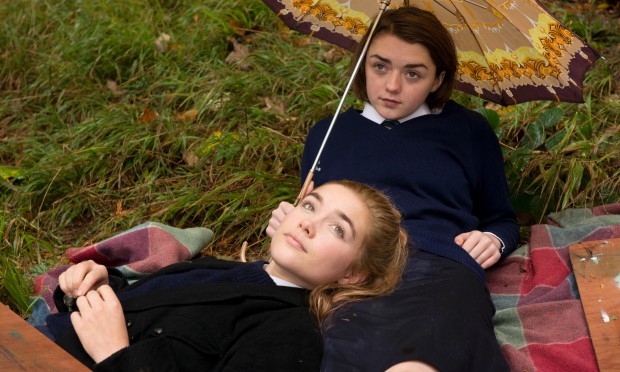Long live the glockenspiel, that typically dull percussion stalwart usually relegated to primary school memories, along with humdrum gym classes and endless repetitions of Kumbaya. Here the glock is like a new instrument altogether. Its eery, metallic tones haunt the early scenes of Carol Morley’s The Falling, filling them with an unexpectedly ethereal quality that is both childlike and yet somehow sophisticated at the same time – just like the longed for worldliness of the impatient teenage girls at the heart of this warped coming of age story.
The music (recorded by Everything but the Girls’s Tracey Thorn) is the backbone of this flawed yet deeply atmospheric film, which gets under your skin and stays there. Particularly, I suspect, for women and even more so for women who have ever been to an all-girls school, hotbeds of jealous passions and faux maturity. Remember the little rebellions (skirt length, skiving assembly), the anxiousness to have experienced everything (first kiss, nonchalant cigarette smoking), and the lies girls tell to imply experience, especially when it comes to boys?
All those classic teenage dramas are present in the claustrophobic little school world Morley has created, intensified by the passions of the late sixties setting, where sexual awakening threatens the social dynamics of teenagers and repressed school ma’ams alike, and where louder battles for gender equality sit unnervingly but unmistakably just around the corner.
Sixteen-year-old Lydia, played by the prodigiously gifted Maisie Williams (that’s Arya from Game of Thrones, with just as much gusto but less swordplay) is best pals with Abbie (a wildly confident debut from the soon-to-be mega-star Florence Pugh), both rallying against the confines of their exceedingly English and at times amusingly repressive countryside girls school. Monica Dolan and Greta Scacchi both inject some humour as tight-lipped, chain-smoking relics of the age.
Abbie has recently lost her virginity and discovered she might be pregnant, at once creating both a practical difficulty but also an emotional barrier that sets her apart from her bestie and everyone else. Lydia wants desperately to be just like Abbie, but is also terrified of what this brave new world means, especially since her friend’s romantic trysts involve Lydia’s own brother and because her own family life is abnormally stuck in the past. Her near mute mother (Maxine Peak) is agoraphobic and deeply scarred for reasons we don’t understand until the end of the film, running a home hair salon where she styles customers’ locks in outmoded beehives.
Abbie’s sexual advancement unsettles Lydia and when an unexpected tragedy strikes, the scene is already set for the seemingly hysterical response: a series of mass faintings, prompted by Lydia but with a ripple effect all the way up to the staff room.
The girls panic, the teachers panic, the doctors don’t quite panic but remain powerless to stop it (though articulate enough to deride it as a kind of womb-induced silliness). There are echoes here of The Crucible, of Sofia Coppola’s The Virgin Suicides and of Peter Weir’s Picnic at Hanging Rock – acknowledged influences for Morley – but also of real-life incidences of the phenomenon scientists call ‘mass psychogenic illness’, including one just last year at a school in northern Colombia, where girls fainted for reasons doctors could not explain. There’s something reminiscent too of Joe Wright’s beautiful Atonement adaptation, the heat and precariousness of it.
So what is going on in The Falling? It’s never quite clear whether the epidemic is feigned, either on a conscious or subconscious level, or whether there is a more ominous medical mystery at play. What is most important here is the mood, thick with burgeoning sexuality and fraught friendships. In fact, the film is at its best when it is unresolved, as uncertain of its own meaning as the girls themselves are, wavering between cockiness and anxiety. It is at its worst when, near its finale, it tries to rationalise Lydia’s behaviour by creating a traumatic backstory for her mother. As fabulous an actress as Maxine Peak is, I simply didn’t care. I didn’t want Lydia’s behaviour explained away by something that happened long ago. I wanted it rooted in the beautifully shot and unsettlingly familiar now.
The beauty of the film is that it is at once personal and universal, with an ability to make you feel nostalgic for friendships and teenage journeys that were probably, at the time, not actually very nice at all. Like Morley’s 2011 documentary Dreams of a Life, about the identity of a woman found dead after three years decomposing in her London flat, The Falling has gaps. But it’s precisely in those gaps that the magic lies.






Comments